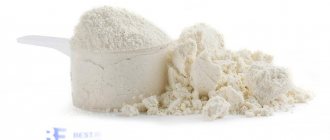What is whey protein and how to obtain it
Whey protein powder is made from natural milk, which in itself means the natural origin of the sports supplement. To obtain the product, when milk is curdled, the whey, which contains the dry product, is separated. Next, a concentrate is obtained from the whey by filtration: micro- or ultrafiltration, nanofiltration and reverse osmosis.
Filtration is necessary in order to retain large protein molecules through meshes of various sizes. Depending on the required type of product (concentrate, isolate, hydrolyzate), the molecules can undergo more complex purification, removing the maximum amount of fat and carbohydrates in the process, and even partially breaking down the protein almost to amino acids. The resulting molecules are dried and protein powder is obtained.
Types of Whey Protein
During the production process, three types of whey protein are obtained - wey (from the English - Whey), which has a different composition, more precisely the ratio of BJU. The purer the product is needed, the more stages of purification at low temperatures it goes through, so as not to expose the proteins to destruction.
Whey Protein Concentrate
The first type, which is obtained from whey, contains about 80% protein, the remaining 20% consists of fats, carbohydrates and other substances (cholesterol, vitamins, enzymes, flavorings). This product is most preferable for gaining muscle mass, for use after training, replenishing the body with essential nutrients.
Whey Protein Isolate
This type is obtained by purifying protein from fats and carbohydrates, the content of which is practically reduced to zero. Thus, this type becomes allowed for drying and has a beneficial effect on the process of weight loss, since it does not contain lactose. Isolate compositions can be further enriched with non-essential, essential amino acids and vitamins.
Whey Protein Hydrolyzate
The cost of the supplement increases significantly during the production process, since the method itself is not cheap and requires partial fermentation of the protein with pancreatin. Thus, a quickly digestible pure product is obtained, which has caught up with amino acids in terms of absorption rate. The breakdown speed reaches 30 minutes maximum. But this type causes a sharp jump in insulin, which is more suitable for gaining weight than losing weight.
Let's sum it up
So let's recap.
This is a completely natural product. If we are talking about whey protein, then it is made from milk, from whey by removing fats, carbohydrates and other unnecessary compounds. Only the protein remains, which is filtered, dried, and then, depending on whether it is an isolate or a hydrolyzate, it is further purified and filtered. Can protein be harmful? Maybe, but under certain conditions. Usually this may be some kind of allergic reaction or indigestibility. This occurs for two reasons: it may not be digested if it contains lactose, and you are lactose intolerant. Or you may be allergic to some components that manufacturers add. I mean additives, some kind of flavoring or sweeteners. But this also occurs very rarely and only when the protein is cheap, low-quality additives are added to it.
Protein mixtures are a good source of protein, which can be classified not even in the category of sports nutrition, but in the category of food products. It is good to introduce it into your diet as an additional source, plus you can use it when you really need it (after training and after sleep). And it's a convenient source of protein that you can quickly prepare and take with you everywhere. Have questions? Write and ask in the comments below!
The benefits and harms of whey protein
Pros of the supplement:
- Allows you to gain muscle mass.
- Accelerates recovery after training.
- Some supplements do not interfere with weight loss and are allowed even with strict diets.
- Quickly absorbed.
- Easily stirs wherever and whenever.
Minuses:
- Different absorption rates imply individual selection of protein types. For example, the concentrate is undesirable for drying and for taking before bed.
- Some types contain large amounts of milk sugar, a simple carbohydrate, which is undesirable for weight loss and for people who are lactose intolerant.
What is it needed for
To understand why athletes of different strength types need whey protein, you will have to delve into biochemistry. The rate of absorption of this protein varies from 3 to 10 minutes. Hence, it is taken before, during and after exercise. What does this give?
- Before training – reducing the catabolic effect of pumping training.
- During training – a temporary improvement in strength indicators by 2-3%, which allows you to lift a few more weights.
- After training – closing the protein window.
As a result, this stimulates the development of the athlete, moving his athletic performance forward.
Proper intake of whey protein will help:
- During drying - in the early stages (before sodium is drained) it will reduce catabolism in the muscles immediately after training, without affecting the overall balance of calorie intake. At this time, the synthesis of new amino acids is a priority for the muscles - which means that the body will not burn protein into carbohydrates.
- For mass gain, increase protein levels without affecting calorie content. This allows you to get a higher ratio of pure muscle mass to total weight.
- When losing weight, it will increase your overall well-being by adding protein. Will reduce the load on the gastrointestinal tract. Will be a replacement for frequent snacks to speed up metabolism
- While maintaining shape. Makes it easier to control your protein intake. It will increase strength indicators, which will create an excellent anabolic background.
Which is better - whey protein or complex protein?
Depending on your goals, such as weight gain, a complex or multi-component protein will be an excellent assistant for preserving muscle catabolism and for overnight recovery. Such supplements contain several types of protein, usually: casein, whey protein, possibly egg or soy protein. But not everyone needs these components. In women, for example, the complex is absorbed worse and threatens to gain adipose tissue. Also, for those who work on relief, a complex supplement is not suitable. Accordingly, whey protein is a purer, more versatile and neutral product for any purpose, depending on its type.
How to take whey protein
To work on relief, whey protein isolate is suitable, which is best taken after training or in the first half of the day. Do not exceed two servings per day, stir the powder in water.
Whey protein concentrate and hydrolyzate are suitable for gaining weight Both options can be consumed in the morning after waking up to prevent catabolism, before or after training. Compare the composition of the powder with food products, taking into account the daily calorie intake and the BJU ratio. Stir the powder into milk or juice.
Time of administration and dose
To take protein, calculate the daily biorhythms and biochemical processes occurring in the body in the morning, afternoon and evening. Apply the correction factor on days of training and sports competitions.
Remember: the rule “more is better” does not apply when taking whey protein. The daily norm for athletes is calculated by a sports doctor together with a nutritionist. They take into account the amount of natural proteins from the food of the daily diet, add concentrate at a general calculation: 2 grams per kilogram of the bodybuilder’s weight. For a healthy diet for non-athletes, a different formula is used. When compiling it, the nutritionist relies on the age, gender, constitution of the ward.
Rating: Best Whey Protein Brands
- Optimum Nutrition is a sales leader in the sports nutrition market. The brand has been a favorite of professional athletes and gym enthusiasts for many years. ON undoubtedly surpasses the competition in the quality of whey protein, which is endowed with both concentrates, hydrolysates and isolates. The cost of one can is approximately 1800 rubles.
- Ultimate Nutrition is an American brand of sports nutrition, along with ON, which is famous for its advanced technologies and quality standards for its products, including whey proteins. The brand's products have a high protein content per serving compared to competitors, and essential amino acids are also used to enrich the composition. The content of fats and carbohydrates is minimized. The cost of one can is from 1500 rubles.
- SAN - the brand is famous for its whey protein isolate supplements, which are often classified as hydrolysates. Proteins are maximally purified from fats and carbohydrates, and are also enriched with BCAAs, lactoferrin and alpha-lactalbumin, which help maintain nitrogen balance for better anabolism. The initial cost of such products is 2,500 rubles.
- Dymatize. The brand holds a leading position in sales of its “brainchild” - whey protein isolate ISO-100. The product is most preferable for athletes who are cutting, including famous bodybuilders and participants in the bikini fitness category. The cost of whey protein isolate is approximately 3,500 rubles.
- BioTech - the brand has become one of the leaders (along with ON) in the production of high-quality whey hydrolysate. The supplement contains practically no fats and carbohydrates (0.1 g and 0.13 g), and is absorbed as quickly as possible. And most importantly, it contains natural stevia - a natural sweetener. Perhaps one of the most expensive protein hydrolyzate supplements, per jar – 4,400 rubles.
Effect of Whey Protein on Muscle Mass and Strength
Whey protein is most often taken to build muscle and improve physical strength. This supplement is very popular among athletes, bodybuilders, fitness models, and those who regularly work out in the gym.
Here's how whey affects muscles and muscle strength:
- Whey powder provides the body with proteins and amino acids that are needed for muscle growth.
- Whey protein enhances the release of anabolic hormones that stimulate muscle growth (such as insulin).
- Whey protein is high in the amino acid leucine, which is known to stimulate muscle protein synthesis at the molecular and genetic level.
- Whey protein is digested and taken up by cells faster than other types of protein.
It is especially effective when consumed immediately before, after or during training (protein synthesis is usually maximum after the end of physical activity). However, recent research has concluded that the most significant factor for muscle growth is the total amount of protein consumed per day. So it doesn't really matter whether you consume protein during or outside of training.
Whey protein is considered superior to other types of protein (especially soy). Compared to casein, the advantage is not so obvious. Whey appears to be effective in the short term, but casein stimulates muscle growth over a longer period of time, so the results are similar.
However, keep in mind that if you don't have enough protein in your diet, whey protein supplements are unlikely to have a significant impact on your results. On the other hand, in one study of older adults who consumed adequate amounts of protein, there was no difference in muscle growth between the whey-only and carbohydrate-only groups for 12 weeks combined with regular exercise.
Thus, the beneficial effects of whey protein on muscle and muscle strength are controversial, and results may vary significantly between individuals. If you eat a lot of meat, fish, eggs and dairy products (also rich in protein), then the effectiveness of the whey will likely be minimal.
Conclusions: There is a lot of evidence that whey protein is effective in increasing muscle mass and strength, although some studies show no benefits.
Whey protein for weight loss
It is known that protein can help you lose weight. It increases metabolism by 80-100 calories per day, and this automatically leads to the fact that a person eats 300-400 fewer calories per day. One study found that consuming 25% of your daily calories in protein reduces food cravings by 60% and reduces the desire to snack at night by half. Consuming whey protein is a great way to increase your protein intake, which is important for weight loss.
Research has shown that replacing other calorie sources with whey protein, combined with exercise, can result in weight loss of up to 10 pounds while building muscle mass. So if you're trying to lose weight, whey protein supplements can help you both lose weight and maintain muscle.
Conclusions: Protein has been shown to reduce weight by increasing metabolism (calorie expenditure) and reducing appetite (decreasing calorie intake). Whey protein can help increase fat loss while maintaining muscle mass.











